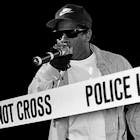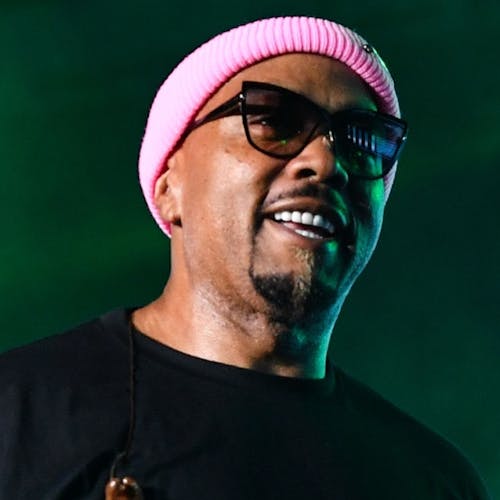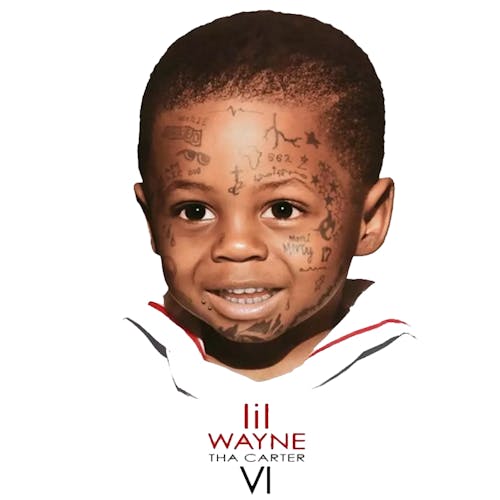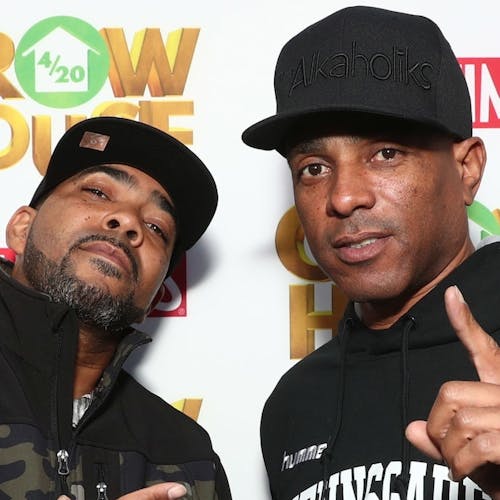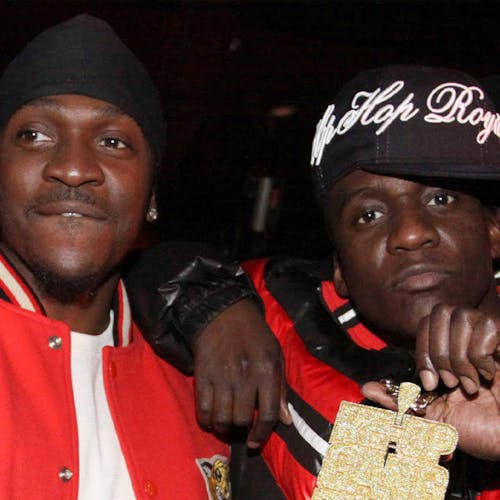
Hip-Hop Label 101: Roc-A-Fella Records
Hip-Hop Label 101: Roc-A-Fella Records
Published Thu, November 5, 2020 at 5:27 PM EST
Roc-A-Fella Records. The name is legendary in Hip-Hop and across contemporary music.
It's the house that Shawn "Jay-Z" Carter and Damon “Dame” Dash built, along with Kareem "Biggs" Burke. A record label that came to epitomize self-actualization and Hip-Hop's penchant for dreaming big. Before Jay-Z’s marriage to Beyoncé, before the contemporary success with Watch the Throne and 4:44, the superstar had his beginnings in the concrete jungle: New York City.
DJ Clark Kent had been a director of A&R at Atlantic when he first heard a former drug dealer-turned-rapper out of Brooklyn, New York.
Kent was immediately impressed by this guy Jay-Z and brought him to his label. Atlantic passed, but Kent introduced Jay to this guy from Harlem who was managing another Atlantic act named Future Sound.
"When [Clark] met Dame, he peeped his hustle," the late Hip-Hop attorney/executive/podcast host Combat Jack would explain to Joe La Puma decades later. "And as they got tighter, Clark felt Damon was the right guy to manage Jay. He felt Dame could be the outside hard-nosed guy to go head to head with the labels. Clark also had a studio in his home in Brooklyn, so as a producer, his studio was like the head quarters in terms of laying down mad tracks for unsigned artists like Jay. Other than being ears for Jay’s music, Clark acted as the co-signer to Damon and Jay, extending the scope of industry connects Dame had inside the industry."
As most Hip-Hop fans now know, Jay-Z had been floating around the business for years. He'd appeared on his friend Jaz-O's hit "Hawaiian Sophie" in 1989, collaborated with Big Daddy Kane around 1994, and guested on "Can I Get Open?" by Original Flavor in 1995. Original Flavor was managed by Damon Dash. Jay and Dame clicked, as did a third friend, Kareem "Biggs" Burke, who'd been an associate of Dame's for years. Dame and Biggs were suave Harlem hustlers, but they respected the Brooklynite Jay for his style. It all worked.
"Without Dame and Jay and myself together, I don’t think this would’ve happened," Biggs told ItsTheReal earlier this year. "It was a perfect situation."
Biggs was the money guy. He'd known Dame since the two of them had come from a crew called The Best Out, known for throwing lavish parties around Harlem. "I was the youngest," Biggs recalled. "My brother Bob, Dame Dash, Rel, we all threw a party [that] even Mike Tyson paid to get into. We gave 100 bottles of Moet. Girls at the skating rink were saying that party was 'the best out.'"
After Jay-Z kept getting rejected from labels, the old friends decided to pool their resources to launch the would-be rap star themselves. "Dame and Jay took that role, with visiting labels. I played the role more like a road manager, at that time, just supporting them with the lifestyle and everything."
"Once they got turned down they came back to me to think about how to put Roc-A-Fella together."
DROP YOUR EMAIL
TO STAY IN THE KNOW
The three founded Roc-A-Fella Records and released Jay-Z's first singles independently. Jay's rep began to grow; there was the lavish music video for "In My Lifetime," and a Bronx battle between DMX and Jay (to say nothing about the beef with Nas) would eventually become the stuff of legend. As a single, "In My Lifetime" generated street buzz, and everyone believed they could turn this into a major venture.
"When you’re young and you haven’t done a lot of business…we were confident enough in ourselves and Jay’s ability that we would build even more than what we did," Biggs said. "[Jay's debut album] Reasonable Doubt was the platform we used, but we knew that we would use that platform…to get into tech, sports, films, fashion and spirits."
Reasonable Doubt's 1996 release made Roc-A-Fella a formidable name in Hip-Hop. The gold-selling album was considered a significant success for an indie label, and majors soon came calling. Def Jam would purchase a 50% stake in Roc-A-Fella in the spring of 1997; and Jay’s sophomore album In My Lifetime, Vol. 1 would see release that early fall. The album would outsell its predecessor and hit No. 3 on the Billboard Hot 100. Jay-Z was now a bonafide star, but also—Roc-A-Fella was a major force.

Once they got turned down they came back to me to think about how to put Roc-A-Fella together..."
- Kareem "Biggs" Burke
The label's attempted signing of Jaz-O stalled, but Jay-Z protege Memphis Bleek soon signed with Roc-A-Fella. And 1998 would be the label's breakout year, as Roc-A-Fella's Streets Is Watching became a hit video release, as did the accompanying soundtrack, which served to announce new artists on the label. But Roc-A-Fella's biggest success came that fall, with the release of Jay-Z's multiplatinum third album Vol. 2...Hard Knock Life. That album's success cemented Jay-Z as one of the biggest names in Hip-Hop and served as a launchpad for new Roc-A-Fella signees like Amil and, most notably, Beanie Sigel. Roc-A-Fella closed 1998 with another platinum-seller: DJ Clue's The Professional.
By 1999, the company Dame, Jay, and Biggs built was rolling out studio albums, mixtapes, remixes, and more. Memphis Bleek would release his debut album, and the company expanded into fashion. Rocawear made its debut in 1999, quickly becoming one of the biggest names in urban designer wear. As Y2K dawned, Jay-Z released another platinum-selling album in Vol. 3...Life & Times Of S. Carter. Roc-A-Fella's brand was booming, sitting at the forefront of Hip-Hop on an image that traded in both street authenticity and lavish luxury.
Jay-Z was now one of the biggest artists in music, collaborating with superproducers like Timbaland and Swizz Beatz, with a seemingly endless supply of radio hits and popular videos that made him a pop culture fixture. And Dame had become one of the most successful young executives in the business, enjoying his notoriety and becoming infamous for his brash and brazen attitude.
Dame's heavy-handedness had been a necessary component of Roc-A-Fella's rise; after all, this was an upstart label that had to navigate the treacherous waters of major powerhouses. Dame Dash was fiercely loyal, a tough negotiator, and knew how to get things done. They were now pushing into feature film territory: ROC Films would release the concert film Backstage in 2000, detailing the 1999 Hard Knock Life Tour, which featured Def Jam stars Jay, DMX, Redman, and Method Man. Also that year, Beanie Sigel released his debut album,The Truth, to rave reviews; and the label signed established star Cam'ron and Philly upstart Freeway.
But there were cracks beginning to show.
According to THE BIG PAYBACK: The History of the Business of Hip-Hop by Dan Charnas, Lyor Cohen offered a buyout of Roc-A-Fella in 2001 which Jay-Z is said to have declined out of loyalty to Dash.
Dash seemed to relish playing the “bad cop” to get things done. But his approach was growing increasingly uncomfortable for Jay to handle. There was a growing feeling that Jay was distancing himself from Dash’s antics. And Dash’s tendency to make moves without consulting Jay was also becoming something the rapper chafed at.
Dash had given the greenlight to a biopic about he and Jay-Z that Jay reportedly had no knowledge of; as well as the announced promotion of label stars Beanie Sigel and Cam’Ron to executive positions within Roc-A-Fella that Jay told the Source “is a little premature as of right now.”
Even as Roc-A-Fella was rolling (the Roc had signed Cam's The Diplomats crew (aka Dipset) and was seeing platinum success with Diplomatic Immunity in addition to the breakout success of Juelz Santana’s Come Home with Me; as well as Dame having brought over established stars like Ol' Dirty Bastard and M.O.P.), Jay was looking for a change. He announced that his forthcoming project after The Blueprint (soon revealed as The Black Album) would be his last, as the Roc's brand seemed to begin to emphasize other artists like Jim Jones, State Property, Cam, Dipset and new signee, rapper/producer Kanye West (soon to release The College Dropout).
“I knew it was coming to an end. Ain’t no ‘foresee it’ — I was leaving. I was done. I did what I had to do,” Dame said in a 2015 interview with Okayplayer. “I had daughters, so I couldn’t have that environment around my daughters. I couldn’t have a bunch of aggressive men with their own problems around my child. I had to architect my life where I could raise my children.”
In 2004, Jay-Z sold off the remainder of Roc-A-Fella to Def Jam Recordings, where he was named President. The announcement effectively ended Roc-A-Fella as it had previously operated.
"After 10 years of successfully running Roc-a-Fella. Shawn has proven himself to be an astute businessman, in addition to the brilliant artistic talent that the world sees and hears," said Reid in a statement. "I can think of no one more relevant and credible in the hip hop community to build upon Def Jam's fantastic legacy and move the company into its next groundbreaking era."
Jay issued a statement about the move. "I have inherited two of the most important brands in Hip-Hop, Def Jam and Roc-A-Fella," said Jay-Z at the time. "I feel this is a giant step for me and the entire artistic community."
Jay-Z said that he'd initially only wanted his masters and was willing to give up Roc-A-Fella for that. But the sale of Roc-A-Fella made Def Jam/Island Music the sole owners of the label. Roc-A-Fella was still operating under Def Jam, but Dame Dash was no longer affiliated with the label. Dame and Biggs Burke set up Dame Dash Music Group, and with Cam'Ron and Dipset joining DDMG, it led to bad blood between the two camps.
Jay-Z would eventually step down as President of Def Jam and launch his own multimedia brand in Roc Nation. Dash would re-brand DDMG as DD172. After serving four years in prison following a 2012 conviction for marijuana trafficking, Kareem "Biggs" Burke launched his Circle Of Success management company.
This post was updated May 10, 2023.
